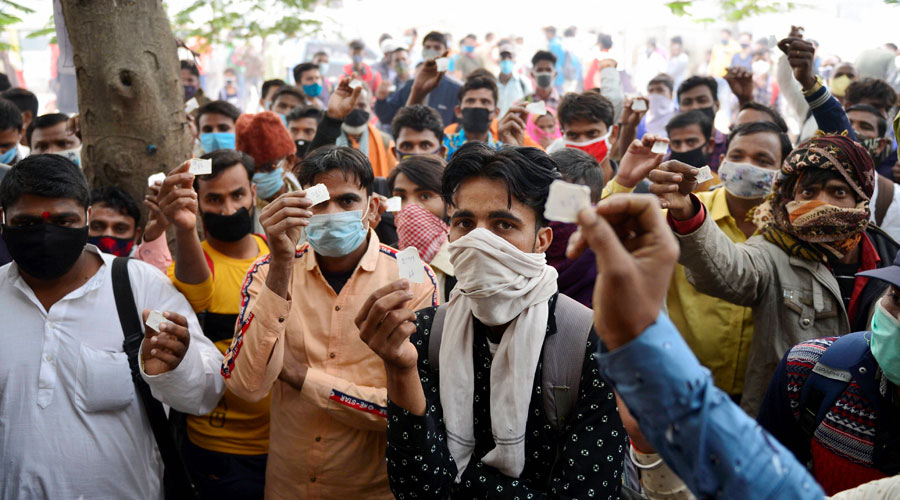Delhi chief minister Arvind Kejriwal on Thursday banned crackers this Diwali and urged people to instead join him and other ministers from their homes in performing Lakshmi Puja on November 14 evening to spread “good vibes” to counter a marauding virus.
Kejriwal made the announcement at a time the capital has been witnessing what he has described as a “third wave” of coronavirus infections. With Delhi reporting close to 7,000 daily Covid cases and experts warning of a “tsunami”, Kejriwal linked pollution to the rising number of cases. Pollution caused by firecrackers would only worsen the situation and could prove dangerous for Covid patients and also those who have recovered, health experts have warned.
In a webcast on Thursday, he said: “The corona situation is deteriorating due to pollution…. If we burn crackers, we will be playing with the health of our children and our families. We are arranging for something different for Diwali this year.
“On November 14, at 7.39pm, we will perform Lakshmi Puja together. I will be performing Lakshmi Puja along with the cabinet ministers, which will be telecast live on some TV channels. I wish to appeal to my brothers and sisters in Delhi to join in the puja. I believe that when the people of Delhi will perform Lakshmi Puja from their homes at the same time, celebrating the return of Lord Ram after 14 years of vanvaas (exile), celebrating the coming of Lakshmiji, it will generate a very positive atmosphere and good vibes in Delhi.”
Kejriwal later tweeted: “Reviewed corona situation in Delhi and preparedness with chief secy, health officials and all DMs....Corona cases have increased due to festival season and pollution. It was decided to 1. Ban crackers in Delhi 2. Ramp up medical infra; oxygen and ICU beds are being increased in Del govt hospitals.”
He said his government would move the Supreme Court to vacate a stay on the administration’s order to big private hospitals to reserve four out of every five ICU beds for coronavirus patients.
On November 4, Delhi recorded 6,715 cases and 66 deaths. From October 25 to November 3, 50,616 new cases have been recorded in the capital, which is 13 per cent of all cases since the pandemic began. Of the 1,246 beds with ventilators in ICUs for coronavirus patients, only 360 were vacant on Thursday evening.
Kejriwal’s office did not respond to queries on what they intended to do to curb the “third wave” besides performing Lakshmi Puja, nor did he reply to questions on whether his call to pray was congruent with constitutional secularism. In March, the chief minister had advised citizens to read the Bhagavad Gita to keep themselves occupied during the lockdown.
A leading public health expert told this newspaper that if the laxity in physical distancing norms continued, the capital could face a “tsunami” of new cases that might be difficult for hospitals to accommodate.
Oomen John, senior fellow at the international think tank The George Institute of Global Health, said: “We have seen a sudden frenzy of activity in Delhi, and many have completely lowered their guard. On the road, you can see 80 per cent of people not wearing masks properly. On their own, shopkeepers have decided not to restrict the number of people present inside a store.”
He added: “The periodic spurts in cases are not due to any change in the behaviour of the virus but is dependent on the behaviour of people. In three to four weeks, things may get really bad in Delhi because of the behaviour of people. We may have a tsunami of cases…. We need to keep transmission of the virus at a rate where it does not overwhelm the public health outreach systems….”
John said that countries like Vietnam and Taiwan had not seen any fresh Covid cases emanating within their territories in 200 days because of strict enforcement by the government and cooperation of the people.
“The state needs to do strong messaging that anybody and everybody is at risk, and crowding in public places must be stopped…. If we had good data on people’s mobility — like data of mobile signals — then based on that we can see the effect of increased mobility on the number of cases. In proactive places, governments are better prepared for cases three to four weeks in advance and do positive messaging accordingly, based on such data,” John said.











